Helen Lowe's Blog, page 300
April 25, 2011
Tuesday Poem: NZEF Trooper 203453 by Leigh Vickridge
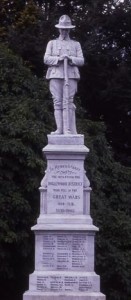
ANZAC Memorial (Inglewood)
NZEF Trooper 203453
He was born at Longton Avenue
in London
not far from Crystal Palace
High tea on Sunday evenings
with the mater and the pater
then minor public school
Gallipoli washed away all that –
carnage at Chunuk Bair
flyblown corpses in the sun
His number was not up:
a shrapnel wound and fever
saved his life
Rehabilitation came
land impossible to farm
near the Bridge to Nowhere
The Depression brought ruin
too old to fight
in a second war
Crumbling health
memories of friends
long dead
His ashes cast
on the cleansing waters
of a mountain stream
In Aotearoa
on Taranaki Mountain
not far from Dawson's Falls
.
© Leigh Vickridge, 2008
Published in The Christchurch Press, 23 April 2008
—
April 25 is ANZAC Day—ANZAC standing for the Australia New Zealand Army Corps—and primarily commemorates the participation of New Zealand service men and women in the First and Second World Wars.
This poem was written by Leigh Vickridge, the father of one of my school friends, in commemoration of his father who served in the NZ Expeditionary Force in World War 1. The poem has an elegaic quality that I always feel "speaks" quite profoundly to the ANZAC experience. I submitted the poem to The Chriscthurch Press on Leigh's behalf, but sadly he himself passed away shortly before it was published on 23 April 2008. I reproduce it here today for ANZAC Day, but also in memory of both Leigh and his father, the latter whom I knew only—schoolgirl fashion—as "Old Mr Vickridge."
April 24, 2011
The Hugo Award Finalists 2011
The Hugo Award is one of the major awards for excellence in the field of science fiction and fantasy. The Hugos are awarded each year by the World Science Fiction Society, at the World Science Fiction Convention (Worldcon). This year's finalists—to be announced at Renovation, the 2011 World Science Fiction Convention, 17-21 August—have just been made public and include:
Best Novel
Blackout/All Clear by Connie Willis (Ballantine Spectra)
Cryoburn by Lois McMaster Bujold (Baen)
The Dervish House by Ian McDonald (Gollancz; Pyr)
Feed by Mira Grant (Orbit)
The Hundred Thousand Kingdoms by N.K. Jemisin (Orbit)
Best Novella
"The Lady Who Plucked Red Flowers beneath the Queen's Window" by Rachel Swirsky (Subterranean Magazine, Summer 2010)
The Lifecycle of Software Objects by Ted Chiang (Subterranean)
"The Maiden Flight of McCauley's Bellerophon" by Elizabeth Hand (Stories: All New Tales, William Morrow)
"The Sultan of the Clouds" by Geoffrey A. Landis (Asimov's, September 2010)
"Troika" by Alastair Reynolds (Godlike Machines, Science Fiction Book Club)
Best Novelette
"Eight Miles" by Sean McMullen (Analog, September 2010)
"The Emperor of Mars" by Allen M. Steele (Asimov's, June 2010)
"The Jaguar House, in Shadow" by Aliette de Bodard (Asimov's, July 2010)
"Plus or Minus" by James Patrick Kelly (Asimov's, December 2010)
"That Leviathan, Whom Thou Hast Made" by Eric James Stone (Analog, September 2010)
Best Short Story
"Amaryllis" by Carrie Vaughn (Lightspeed, June 2010)
"For Want of a Nail" by Mary Robinette Kowal (Asimov's, September 2010)
"Ponies" by Kij Johnson (Tor.com, November 17, 2010)
"The Things" by Peter Watts (Clarkesworld, January 2010)
Best Graphic Story
Fables: Witches, written by Bill Willingham; illustrated by Mark Buckingham (Vertigo)
Girl Genius, Volume 10: Agatha Heterodyne and the Guardian Muse, written by Phil and Kaja Foglio; art by Phil Foglio; colors by Cheyenne Wright (Airship Entertainment)
Grandville Mon Amour, by Bryan Talbot (Dark Horse)
Schlock Mercenary: Massively Parallel, written and illustrated by Howard Tayler; colors by Howard Tayler and Travis Walton (Hypernode)
The Unwritten, Volume 2: Inside Man, written by Mike Carey; illustrated by Peter Gross (Vertigo)
John W. Campbell Award for Best New Writer
Award for the best new professional science fiction or fantasy writer of 2009 or 2010, sponsored by Dell Magazines (not a Hugo Award).
Saladin Ahmed
Lauren Beukes
Larry Correia
Lev Grossman
Dan Wells
Note: All Campbell finalists are in their 2nd year of eligibility.
Other Award categories include: Best Related Work; Best Dramatic Presentation, Long Form; Best Dramatic Presentation, Short Form; Best Editor, Short Form; Best Editor, Long Form; Best Professional Artist; Best Semiprozine; Best Fanzine; Best Fan Writer; and Best Fan Artist. You can see the full list of finalists, here.
—
With respect to the John W Campbell Award for Best New Writer, you may recall that Saladin Ahmed posted as part of Mary Victoria's guest series on Writing Strong Women. You can read his guest post here.
—
You may also recall that last year I had a lot of fun reading all the Hugo Award fiction finalists and blogging about the experience on HarperVoyager USA, in the following series of posts:
The Hugo Awards: the Reading Has Begun
The Hugo Awards: Going Down to the Wire
The Hugo Awards: Making Tough Choices
The Hugo Awards 2010: Being There
I am thinking that I may do the same again this year, my own writing commitments allowing—although this time I think I might begin with the novels, rather than leaving them to the end. And given that's quite a lot of reading, around now could be a very good time to start … 
April 23, 2011
Blog Roll
Every now and then someone sends you a link where you go: "Yes—that is so how it is." This is one of those links. Penned by Chuck Wendig and titled "Six Reasons You're Not Ready To Be A Professional Writer" it elicits that funny mix of both humour and "ouch" that articles do when they hit the nail on the head. So enjoy—and be aware: this really is how it mostly is. Here's an excerpt from the opening salvos:
" "I want to be a writer when I grow up."
Sure you do, kid. Sure you do …
… And I'm here to tell you that you might not be ready. You might earn a big red stamp — *fwomp* UNFIT — on your Authorial Acceptance Exam. Not sure if you've got what it takes to carry the pens? To churn and burn through barrels of ink? To march forth across the bleached and cracked earth with only your word count on your back?
Let's check you out, then …"
Click here to read the full post.
—
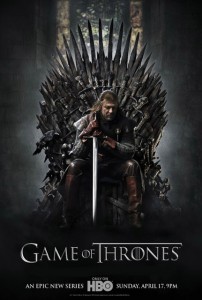
Sean Bean as Ned Stark
You may recall that on April 4 I posted about the forthcoming HBO series A Game of Thrones, based on the George RR Martin novel of the same name. Well, 'tis forthcoming no more: the first episode (of 10, I believe) has aired in the States and editor Diana Gill has done a great report of her reactions and thoughts on the HarperVoyager blog.
" … So the hype about the HBO Game of Thrones, based on George R. R. Martin's fabulous Age of Ice and Fire saga, was both fabulous and awful. Fabulous, because the books are amazing, and the trailer felt right. Awful, because fantasy epics are so rarely done well on screen–for every LOTR there are 10 painful, sophomoric special effects sequences masquerading as stories …
.. The cinematography is gorgeous, and I loved the opening sequences (of course, I also adore maps). This first episode, like the Lord of the Rings movies, hits exactly what epic fantasy should feel like–grand, sweeping, and epic. It's bigger than you can contain, stark terror and brutality besides honor and moments of beauty. We're barely into the series, but it gets the feel right …
I get the feeling she's clicking the "like" button on this one. But to read Diana's report in full, click here.
—
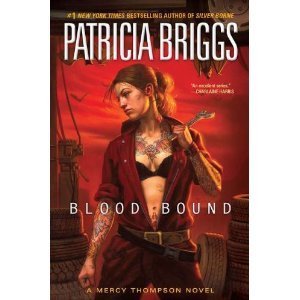 And probably my favourite blog post recently? Patricia Briggs (who writes the Mercy Thompson urban fantasy series) did a post on the Orbit blog titled Mercy and her Friends in My Back Yard. Why did I love it? I found something very evocative in Patricia's description of the voices of coyotes, dogs and wolves in and around her prairie backyard—her writing really made me want to hear them for myself.
And probably my favourite blog post recently? Patricia Briggs (who writes the Mercy Thompson urban fantasy series) did a post on the Orbit blog titled Mercy and her Friends in My Back Yard. Why did I love it? I found something very evocative in Patricia's description of the voices of coyotes, dogs and wolves in and around her prairie backyard—her writing really made me want to hear them for myself.
Here's a snippet: "Their laughing voices aren't beautiful or powerful, the way a wolf's is, but they are incredibly cheerful. There are several dens of coyotes who live in the field behind our house, eating the mice who live in the nearby orchards and vineyards. The pioneers used to call coyotes "prairie song-birds". I keep their voices in my head as I write about my little coyote shapeshifter. There are other voices I hear as well."
To read the full post, click here.
—
And other than that, I hope you're all enjoying the Easter break.
April 22, 2011
Starry Starry Night
Sometimes, I see a picture that's just so well, awesome, that I have to share it.
This one is a photo of our very own Milky Way galaxy taken from the European Southern Observatory on the Atacama Plateau in Chile. The photo was taken by Yuri Beletsky, an astronomer with the ESO Chile observatory.
The two bright glowing spots to the left of the photograph are the Large and Small Magellanic Clouds, satellite galaxies to the Milky Way, while part of the observatory can be seen on the right. The arc of stars spanning between the two is the Milky Way, which we are looking at from the 'inside out'—and perhaps a similar effect to what characters in the TV series Babylon 5 would have called the "galactic rim."
April 21, 2011
Earthquake Report, 22 April: Christchurch—Whose City?
Last Sunday I posted about yet another 5-point (5.3) aftershock and day-to-day life in Christchurch, which currently takes a lot of energy to negotiate, especially if you're living east of the Hills-Fitzgerald line. I also spoke of still feeling committed to Christchurch as a city and wanting to continue living here.
(A friend in Auckland wrote during the week of " … real estate on the North Shore …[in Auckland] … having experienced a mini-boom with people relocating [from Christchurch.]" )
But like many of those who currently feel committed to Christchurch, I can't help being concerned about the longer term future as well. For example, what kind of city is going to rise from the ruins? Whether there's going to be any kind of public process to develop a vision for that? And what opportunity citizens such as myself will have for input? The short to medium term hardships can be endured, but I can't help feeling that it's the outcome of the decisions being made now on the vision for and future shape of the new Christchurch that will determine the long-term commitment of residents such as myself to the city.
The jury's very much out at present as far as I'm concerned, but if some top-down solution is imposed that doesn't reflect Christchurch's values as an urban community, then many of us may end up feeling that we'd be better off finding a city that does. But it is still early days and despite our government-de-jour's apparent fondness for top-down, non-representative solutions, I am still hopeful that we'll end up with a Christchurch that reflects the aspirations of the people living in it. Because in the final analysis it's people that make a city, not just physical infrastructure (although that's mighty important too, as we're learning all over again.)
So the government have put their CERA solution in place—but like many residents I am very much waiting to see how that body performs and whether their plans and processes will include us—or not. There's not a lot of evidence of inclusiveness discernible in the current model, but as aforesaid, it's early days. Aka "watch this space"—and with 300-400 demolitons scheduled at present, the majority of them in the CBD, there's going to be a lot of space to watch.
April 20, 2011
What I've Been Doing …
I realised that I haven't done a "What I've Been Doing …" update for a little while. That's because I have been revising the manuscript for The Gathering of the Lost (The Wall of Night, Book Two.) Revision is hard work, but I enjoy it. I find that this is the time when the book really comes together in terms of plot and character development, motivation—and working in those layers of texture and nuance around the world, as well as bedding in the themes playing out through the whole series. It's a demanding, exciting and challenging process–and a great moment when you feel it all coming together. Right now I am reworking the final chapter of one section of the book in terms of motivation and although I'm still very much at the hard work stage, today it did have that 'coming together' feeling: great stuff!
And of course I shall be doing more of the same tomorrow.:)
—
Those of you who follow this blog will know that I've also been thinking a little bit about epic fantasy lately, here, as well as still enduring that quaky shaky aftermath that is life in Christchurch at present, here.
—
I was thrilled when Plains 96.9FM, the radio station where I do my poetry and book interviews as part of the Women on Air programme, resumed broadcasting on April 6. (The building, although undamaged itself, was in a high risk area post-earthquake so it took some time to get back into the premises and then up and running again.) Things are still getting fully back into swing so I won't be doing my first interview until May 19–but I'm delighted to let you know the interview will be with YA Fantasy Cassandra Clare, author of the Mortal Instruments and Infernal Devices series. The former began with City of Bones, while Clockwork Angel kicked off the newer series. I hope to be talking with Cassandra Clare about the latest Mortal Instruments release, City of Fallen Angels, as well as Clockwork Prince, the second in the Infernal Devices series.
April 19, 2011
Is There A Distinctively New Zealand Speculative Fiction?
I have been thinking and posting about epic fantasy recently and those posts are by no means finished, but the announcement of the Sir Julius Vogel Award 2011 finalists last week set me on another track. I observed last Friday that "… I think the Sir Julius Vogel Award finalists this year make a very strong showing—a great tribute to the SFF currently being created in New Zealand"—and since then I've been thinking: yes, but is there a distinctively NZ flavour to the SFF that we're creating?
I have argued here previously that there doesn't need to be—that spec fic is spec fic is spec fic (or SFF by any other name) and there's no requirement for it to come with a passport. I still hold to that view, but nonetheless confess to curiosity: with or without passport, does NZ spec fic come with a Kiwi accent?
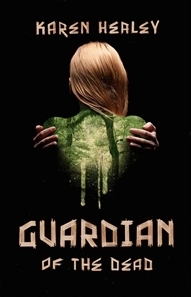 I would love to know what you think, because it's hard for someone like me, who is both inside the genre and resident inside NZ to necessarily 'see clearly' on the matter. Karen Healey's Guardian of the Dead (a finalist for this year's Sir Julius Vogel Award for Best Novel, Young Adult) and David Hair's The Bone Tiki and The Taniwha's Tears both actively draw on NZ Maori myth and folklore as the basis for their Young Adult fantasies. Interestingly, I understand both are now resident in Australia, which leads to further speculation as to whether geographic distance calls one more strongly to the motifs and cultural roots of "home."
I would love to know what you think, because it's hard for someone like me, who is both inside the genre and resident inside NZ to necessarily 'see clearly' on the matter. Karen Healey's Guardian of the Dead (a finalist for this year's Sir Julius Vogel Award for Best Novel, Young Adult) and David Hair's The Bone Tiki and The Taniwha's Tears both actively draw on NZ Maori myth and folklore as the basis for their Young Adult fantasies. Interestingly, I understand both are now resident in Australia, which leads to further speculation as to whether geographic distance calls one more strongly to the motifs and cultural roots of "home."
 So what does make speculative fiction distinctively Kiwi in flavour? Is it enough that the author carries the passport with 'Enzed' stamped thereon and therein? Does it have to be set in New Zealand, have identifiable NZ sub-locales and Kiwi protoganists? Must the fiction work with NZ folklore and myth, either Maori or otherwise (e.g. in the way that Orson Scott Card works with colonial North American folklore in the Alvin Maker series that starts with Seventh Son?) Or is drawing on NZ landscape in the way that Elizabeth Knox does in the Dreamhunter/Dreamquake duology sufficient to give the work a distinctively NZ flavour?
So what does make speculative fiction distinctively Kiwi in flavour? Is it enough that the author carries the passport with 'Enzed' stamped thereon and therein? Does it have to be set in New Zealand, have identifiable NZ sub-locales and Kiwi protoganists? Must the fiction work with NZ folklore and myth, either Maori or otherwise (e.g. in the way that Orson Scott Card works with colonial North American folklore in the Alvin Maker series that starts with Seventh Son?) Or is drawing on NZ landscape in the way that Elizabeth Knox does in the Dreamhunter/Dreamquake duology sufficient to give the work a distinctively NZ flavour?
Cheryl Morgan, in her Salon Futura review of The Heir of Night comments on the treatment of issues of ecological impact and colonialism within the story, and reminds the reader that: "Lowe lives in New Zealand, issues of colonialism are very familiar to her." For me, her observation raises another question: is it possible that cultures have values and preoccupations that come through in their literature and give it a "flavour" that is as distinctive as a passport? And if this is the case, what are our Kiwi preoccupations?
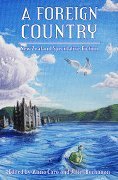 In the 2010 anthology A Foreign Country, (which is a finalist for the Sir Julius Vogel Award 2011 for Best Collected Work) I noticed two strong themes in the collected stories: the first around environmental (in general) and climate change (in particular) dystopia; the second concerned what I would call "reproductive scifi." (I also note that examples from both these categories, Lee Murray's Consumed and Ripley Patton's The Future of the Sky respectively, are finalists for the Sir Julius Vogel Award 2011 for Best Short Story.)
In the 2010 anthology A Foreign Country, (which is a finalist for the Sir Julius Vogel Award 2011 for Best Collected Work) I noticed two strong themes in the collected stories: the first around environmental (in general) and climate change (in particular) dystopia; the second concerned what I would call "reproductive scifi." (I also note that examples from both these categories, Lee Murray's Consumed and Ripley Patton's The Future of the Sky respectively, are finalists for the Sir Julius Vogel Award 2011 for Best Short Story.)
But are these topics, particularly climate change dystopia, exclusively NZ preoccupations? Or is it their treatment that is in some way distinctively Kiwi: for example, I loved the portrayal of bureaucratic "border control" at work in Consumed—but although environmental border control is undoubtedly a NZ preoccupation, I doubt it is an exclusive one internationally.
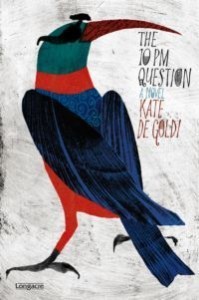 I have heard another NZ author, Kate De Goldi, (best known for The 10 Pm Question, which I note is not speculative fiction) say that every author has their writing "bone", upon which they gnaw through the medium of their work. If she is right then I suspect it may be equally true that writers born of the same nation may also have certain cultural bones upon which they all gnaw—perhaps even as nebulous as a Kiwi value set / attitude to the world that imbues our writing. But I do not feel I have sufficient distance to even say whether such bones really do exist, let alone to opine with any certainty as to what they might be.
I have heard another NZ author, Kate De Goldi, (best known for The 10 Pm Question, which I note is not speculative fiction) say that every author has their writing "bone", upon which they gnaw through the medium of their work. If she is right then I suspect it may be equally true that writers born of the same nation may also have certain cultural bones upon which they all gnaw—perhaps even as nebulous as a Kiwi value set / attitude to the world that imbues our writing. But I do not feel I have sufficient distance to even say whether such bones really do exist, let alone to opine with any certainty as to what they might be.
I would love to know your thoughts though, or whether others out there see more clearly and feel that there is something present in our speculative fiction that is distinctively New Zealand?
April 18, 2011
Tuesday Poem: "The Gift Outright" by Robert Frost
The Gift Outright
The land was ours before we were the land's.
She was our land more than a hundred years
Before we were her people. She was ours
In Massachusetts, in Virginia,
But we were England's, still colonials,
Possessing what we still were unpossessed by,
Possessed by what we now no more possessed.
Something we were withholding made us weak
Until we found out that it was ourselves
We were withholding from our land of living,
And forthwith found salvation in surrender.
Such as we were we gave ourselves outright
(The deed of gift was many deeds of war)
To the land vaguely realizing westward,
But still unstoried, artless, unenhanced,
Such as she was, such as she would become
by Robert Frost
—
Poet & Poem: A four-time Pulitzer Prize winning American poet, teacher and lecturer, Robert Frost is one of America's best-known poets, and his work has remained popular since his death in 1963. For John F Kennedy's inauguration as President of the United States Robert Frost wrote a new poem titled Dedication. But—so the story goes—the 87 year-old poet couldn't see the words because of the sun's glare on the bright but cold, January inauguration day. So he recited The Gift Outright from memory instead.
I have always liked the way The Gift Outright speaks to our colonial relationship with environment, although I have also always felt that the lines "To the land vaguely realizing westward // But still unstoried …" in themselves epitomize colonialism, because of course the American Indians already had many stories—the colonists just didn't know them. Although if you take the lines as simply meaning that the colonists as yet have no stories tied to the new land, then that interpretation fits with the rest of the poem.
—
To read the featured poem on the Tuesday Poem Blog—and link to other Tuesday Poets posting around NZ and the world—either click here or on the Quill icon in the sidebar.
April 17, 2011
What I'm Reading: Patricia McKillip's "The Changeling Sea"
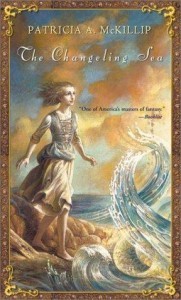 Generally I talk about books I haven't read before, but every now and then, especially when the earth that you've always relied upon to be solid and, well, reliable, starts being all quaky and shaky and liquefacty—I don't know about you, but in circumstances like that I definitely feel in need of an old friend or two to keep me company. And for me, books I love and still come back to are very definitely "old friends."
Generally I talk about books I haven't read before, but every now and then, especially when the earth that you've always relied upon to be solid and, well, reliable, starts being all quaky and shaky and liquefacty—I don't know about you, but in circumstances like that I definitely feel in need of an old friend or two to keep me company. And for me, books I love and still come back to are very definitely "old friends."
Patricia McKillip's novel The Changeling Sea, first published in 1988, is one such old friend and the one I chose to pick up as my latest read.
So what's it about? I don't want to give too much away so I'll give you the back cover teaser:
"The sea has taken everything Peri loved–and she is determined to have her vengeance."
Basically, Peri—a fisher girl—decides to hex the sea and that impetuous decision brings magic, gold, a sea monster, a prince, a sea witch, a magician and a king into her life, all as part of a puzzle that only she can unravel.
The Changeling Sea is junior fiction and a slender volume of 137 pages, so why do I, an adult reader, love it so much? In many ways it's a very simple story, but I think that is part of its charm because the simplicity allows the characters—and particularly Peri, the withdrawn, stubborn, yet perceptive fisher girl—to shine through. It also allows the beauty of McKillip's language, which is poetic and mysterious and magical, to star as well. This is a fairytale (although not a 'retelling') and McKillip's language weaves its spell. The story is full of enchantments, but it's odd, uncertain, quirky magic, not a dark, grim tale.
The Changeling Sea is a very gentle story, too, full of kindness and humanity and understanding, if (like the magic) these qualities are often seen from odd angles—but it is in no way boring. The tale always draws me in as a reader, spinning its magic around me, and at the end I always feel satisfied and that I want more—both at the same time! I thoroughly recommend it, especially for those who like standalone books, fairytales and fairytale retellings, and life-affirming stories.
Earthquake Report, 17 April: 'Just When You Thought It Was Safe …'
To be honest, I didn't think it was safe. I have read up a bit on what the earthquake pundits say and also listened to a few in-depth expert interviews on the radio—Radio New Zealand, of course, the only media outlet in this country where you consistently get real news and information—so know that we can expect a number of 5-point plus earthquakes for up to a year following the 6.3 earthquake of February 22nd.
Knowing, however, is one thing—having to go through last night's 5.3 shake quite another. Yes, we emerged unscathed, although part of the city lost power, several water mains burst and already damaged roads were damaged further, but really, I think we've all had quite enough of the earth moving. The phrase "so over it already" definitely seems relevant. I also think that for every aftershock of this kind, more people will ask themselves: is this really where I want to be? And for those who have lost livelihood, home, or both, the anchors that tie people to place will be increasingly fraying loose.
Personally, I am still a long way from that point. To paraphrase the words of the Bruce Springsteen song (from the Album Born in the USA), "this is my hometown" by choice, and my partner's in terms of both "born and raised." We're still feeling like we're here for the long haul. But everyone has a tipping point, so I guess for many of us a lot will depend on how long this goes on and how bad the after effects are.
So far, I feel like Christchurch as a community and NZ as a country, supporting us, are doing incredibly well. Within seven weeks of what was a really major earthquake and probably NZ's most significant disaster in terms of level of damage, we have potable water and power back on for the whole city. I have been amazed at the progress made on the roads and I know that the teams working on the sewage system are out there doing their durndest under incredibly difficult circumstances: I'm talking around 2/3rds of the city's pumping stations taken out in the February 22nd 'quake; significant numbers of mains blocked with silt and mud; and even when they're cleared there's still a very real risk of subsidence—especially in heavy rain like we're experiencing right now. And in fact there was a major subsidence incident following the rain earlier in the week.
So everyone's doing their best and I have absolutely no complaints about that, even though the day-to-day amenity east of the Hills-Fitzgerald line is still a very long way from ideal. For those who don't know, Hills Road and Fitzgerald Avenue mark the rough boundary between those parts of the city (outside of the CBD) that are basically ok, i.e. west of the line, and then the city east of the line which is basically not ok. And of course with winter coming on, no one's going to be ok if we don't all continue to conserve power and water and not overload the sewage system.
So that's us here in the shaky city: boxing on day-to-day, despite non-ideal circumstances, and as for a stop to the shaking—the day before yesterday, last month even, would be mighty fine.
—
To read all the Earthquake Reports since February 22nd 2011, look under the General category in the sidebar.




